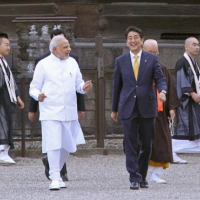India is Open for Business, Modi Tells Japan
 Modi and Abe visited a Buddhist temple in Kyoto on Saturday (photo: Reuters)s
Modi and Abe visited a Buddhist temple in Kyoto on Saturday (photo: Reuters)s
Prime Minister Narendra Modi’s single point objective in his first bilateral visit outside South Asia was to take Indo-Japanese ties to the next level. And he has achieved that handsomely. Modi has visited ancient Buddhist temples, played a taiko drum in an impromptu jam session, participated in a formal tea ceremony, and met a wide section of Japanese society, including business leaders and school children. In short, the Prime Minister has shown Japan that India is a reliable friend, a serious partner, and, most importantly, open for business.
“India is the only country where investors can find three opportunities in one place: democracy, demography and demand,” Modi told Japanese businessmen on Tuesday.
“If you want to look outside Japan, there is no need to look here and there... perhaps there is no country more suitable to you than India,” he said, describing India as the perfect base for exporting to west Asia and beyond.
During his 5-day visit, Narendra Modi has extracted a pledge of nearly $35 billion in Japanese investment and financing over the next five years for infrastructure projects like smart cities and the cleaning of the river Ganga. This is significant since total foreign direct investment from Japan in 2013-14 was $1.4 billion, a mere 5.8 percent of the total FDI that India received that year.
Modi and his Japanese counterpart Shinzo Abe share a special warmth, having met earlier when Modi had visited Japan as the chief minister of Gujarat. The two leaders greeted each other with a bear hug when they met on Saturday evening for the first time on this visit. Modi is one of just four people that Abe follows on Twitter, while the Indian leader admires Abe's brand of nationalist politics.
The Japanese prime minister has offered Modi a bullet train system for the proposed Mumbai-Ahmedabad high-speed rail corridor, saying his country was ready to provide financial, technical and operational support. Japan also agreed to remove restrictions on six of India’s space and defence-related industries.
The two leaders welcomed an agreement to jointly produce rare earth chlorides, a key element of defence industry components and hi-tech wares. Japan could start importing rare earths from India as early as February as it seeks to diversify its sources beyond China.
Annual production will be about 2,000 tonnes to 2,300 tonnes, equal to around 15 percent of Japan's demand, according to the Nikkei business daily.
But there was no agreement on the key civilian nuclear deal for Japan to supply components to India’s reactors. Both sides promised to further accelerate talks towards clinching an agreement soon.
The Japanese are reportedly wary of supplying nuclear technology to a nuclear-armed nation that is not a member of the Nuclear Suppliers group, even one with a spotless proliferation record as India. The Japanese negotiators wanted India to rule out any further atomic tests, but India already has a self-imposed moratorium on tests, which it is reluctant to make permanent.
Nevertheless both countries have upgraded their relationship to a “special strategic global partnership”. Defence cooperation is expected to deepen, with Japan continuing to participate in the Indo-US Malabar joint exercises.
Yet the elephant in the room is, of course, China. Both India and Japan have territorial disputes with Asia’s largest economy, and Japanese business is naturally keen on investing outside China following the rise in anti-Japan sentiment there. In his speech in Tokyo, Modi criticised the 18th-century expansionist ways of some countries that encroach upon the seas and territories of others, in a veiled reference to China.
The prime minister will have a tough balancing act to do in just two weeks’ time when Chinese President Xi Jinping touches down in Delhi for a bilateral visit. Any mention of “expansionist ways” or of Modi’s special relationship with Abe may rankle with his Chinese visitor.
- Karan Singh
To Learn More:
PM Narendra Modi beats the drum, urges investors in Japan to be part of the India story (by Sitaraman Shankar, Hindustan Times)
Japan and India vow to boost defence ties during summit (by Kiyoshi Takenaka, Reuters)
Nuclear vow at Japan-India talks (BBC News)
- Top Stories
- Controversies
- Where is the Money Going?
- India and the World
- Appointments and Resignations
- Unusual News
- Latest News
- India College Chain’s Expansion into U.S. Draws Opposition from Massachusetts Officials over Quality of Education
- Milk Shortages in India Tied to Release of New Movies Featuring Nation’s Favorite Stars
- Confusion Swirls around Kashmir Newspaper Ban in Wake of Violent Street Protests
- Polio-Free for 5 Years, India Launches Vaccine Drive after Polio Strain Discovery
- New Aviation Policy Could Increase Service, Lower Ticket Prices






Comments